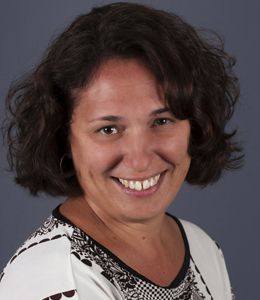Industry Growth
Overall employment of social workers is projected to grow 12% by 2030, much faster than the average for all occupations.
Source: Bureau of Labor Statistics
All Widener University campuses will be open for in-person classes and business on Tuesday, Feb. 24.
If you have concerns about being able to safely get to campus, contact your professor or your supervisor. Visit widener.edu/emergency for details about student services.

With its part-time, cohort and campus-based format, Widener’s PhD program is designed for experienced working professionals interested in becoming stewards of social work’s professional knowledge base.
Doctor of Philosophy of Social Work or PhD of Social Work
On Campus
54
5 years
The mission of Widener University's Center for Social Work Education is to help you develop as an academic leader and sharpen your skills and expertise in research, teaching, and application of theory. Through Widener's social work PhD program, you will cultivate leadership qualities and interpersonal skills to further your development for a career:
In the social work PhD program, we aim to develop you as an academic leader proficient in research, teaching, and advanced social work practice. As you progress through the program, you'll learn to critically analyze social work interventions, delve into the underlying theories and assumptions, and gain a comprehensive understanding of how political, economic, sociocultural, and organizational contexts shape the field.
You'll also have the opportunity to collaborate with interdisciplinary perspectives, use established quantitative and qualitative methods for research, evaluate different social work approaches, develop effective teaching skills, and enhance your writing and scholarship abilities.
View the Loading... for information regarding the course offerings and outcomes for the doctoral program.
Our PhD program accepts students who have either a MSW degree or a master’s degree in a related discipline.
We offer an MSW/PhD option for those students who have a master’s degree in a related field and would like to earn the MSW in conjunction with their PhD. We would be happy to speak with you further about this option.
Overall employment of social workers is projected to grow 12% by 2030, much faster than the average for all occupations.
Source: Bureau of Labor Statistics
per year (average annual salary of a professor of social work in PA)
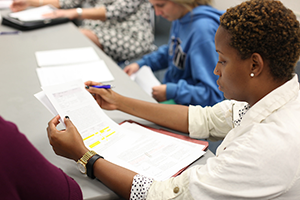
All of your classes will take place on Fridays, in one morning and one early afternoon session. Between classes, you'll experience scheduled opportunities to attend workshops and network with faculty and fellow students. Our commitment to part-time education allows experienced professionals to earn a PhD while continuing to practice in the field.
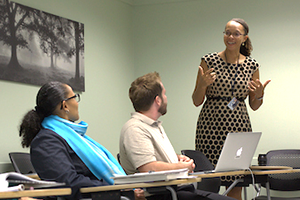
Years one to three of your program will be dedicated exclusively to coursework. In your third year, you will complete a comprehensive examination paper. By the end of year four, you will submit a dissertation proposal for approval and defense. Years four and five are devoted to dissertation preparation under the supervision of the dissertation committee chair.

Forge connections with distinguished guest speakers, motivated peers, accomplished alumni, and our esteemed faculty, who bring the latest trends, technology, and innovative thinking to their teachings. By immersing yourself in this influential network, you'll emerge from your studies with an invaluable community that will support and guide you long after graduation.
"My approach to teaching is best described as embracing an existentialist and social reconstructivist perspective, emphasizing respect for what each student brings to the classroom and students’ responsibility for their own learning. In my teaching at Widener, these methods have resulted in positive outcomes as measured by student course evaluations and verbal feedback."
"I strive to create an engaging, dynamic, and responsive learning environment. By encouraging self-reflection and co-created learning spaces, I aim for students to finish the course with confidence in the material, a sense of leadership in their own learning, and an understanding of the link between their work and social justice."
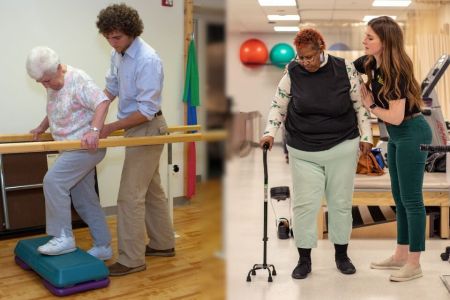
When the Chester Community Clinic first opened in September 2009 its purpose was simple: serve the community and give students an exceptional learning experience. Years of dedication to quality care and strategic transformation have established the clinic as an anchor in the community and a celebrated national model for student-led pro bono care and education.
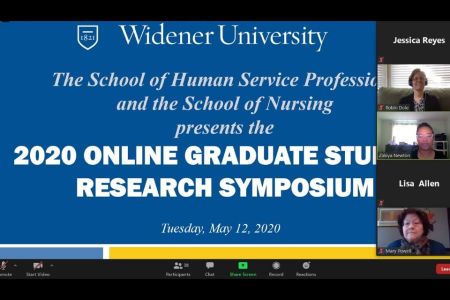
Graduate students showcased the experience and knowledge gained from hands-on research projects during this year's virtual Graduate Student Research Symposium.
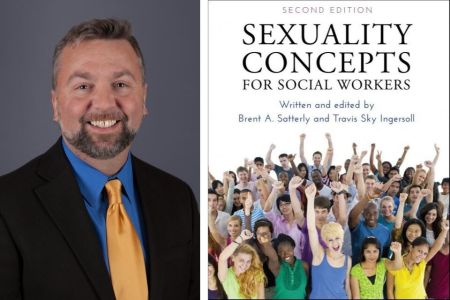
Brent A. Satterly, a professor in Widener University's Department of Social Work, has co-authored and co-edited the second edition of “Sexuality Concepts for Social Workers.” This updated edition...
Our admissions and financial aid teams are here to support you every step of the way. Have a question? Ask away!
Applying online is easy—and it's secure.
What you'll need to apply:
A personal statement (4–6 double-spaced, typed pages) describing professional goals and reasons for seeking a PhD in social work. See guidelines below for further details.
Transcripts from undergraduate and graduate courses of study.
Sample of scholarly (academic) writing that illustrates capacity for critical thinking, writing skill, and appropriate citation of sources. Writing samples should be a minimum of three double-spaced pages in length. Possible sources for your sample include a published research article, a book chapter, a professional report, or a graduate-level course paper.
Three letters of reference—two academic and one professional—addressing applicant’s professional and academic performance.
Current résumé.
Personal Statement
The personal statement is a vital component of your application. It will be used to evaluate your writing skills as well as your ability to conceptualize and articulate your interests in pursuing doctoral-level education.
Please use the following outline to compose your essay, which should be the equivalent of between four and six double-spaced pages.
Decision to Pursue PhD - Discuss why you have chosen to pursue a PhD in social work, including why you have chosen to pursue a PhD versus a Doctorate of Social Work (DSW).
Career Objectives – Describe your career aspirations. How does a PhD fit into that career plan and why is having a PhD necessary to pursue these aspirations? Explain what you hope to do with your Social Work PhD degree.
Personal Background – Describe significant life experiences (professional and/or personal) that have led you to your decision to pursue doctoral education in social work.
Research Interests – Describe your research interests that you would be interested in pursuing in a social work PhD program. These may be general interests or questions, developed from your practice or lived experience.
Personal Evaluation – Discuss your readiness for rigorous graduate work, your ability to manage the heavy demands of graduate school with your other personal and professional responsibilities, your strengths and areas where you are looking to grow, and why you think Widener University’s Social Work PhD Program is a good fit for you.
Interview:
If you are selected to interview for the program, we will contact you to arrange an appointment.
The application deadline for the next academic year is March 30th. Our Social Work PhD program starts reviewing applications on February 1st and then uses a rolling admissions format, which means you can apply when it's convenient for you until the March 30th deadline.
Widener transfer applicants follow the same application process as general applicants. After you apply, our admissions team will work with you to determine whether completed undergraduate and graduate coursework will count towards foundation/core courses that can be waived or substituted.
Widener University serves as a "second home" for students from around the world. We are located just outside of Philadelphia and close to New York City and Washington, D.C.—offering many unique professional and personal opportunities to explore.
Want to know what it's like to be an international student on campus or need assistance navigating English proficiency requirements? We're here to help, and our international admissions director will support you through the application process. This support doesn't end with admissions—our International Student Support team will serve as a valuable resource throughout your Widener journey—meeting Visa/immigration requirements, getting acclimated to campus, and much more.
Learn more about applying as an international student
Learn more about life at Widener as an international student
Because Widener is a private institution, we're able to offer financial assistance that brings our education within reach for individuals who might otherwise not be able to afford it.
You might be surprised how much we are able to offer.
Getting started is easy. Simply apply to Widener and submit your FAFSA to be automatically considered for scholarships and grants. "FAFSA" stands for the Free Application for Federal Student Aid and helps identify whether you are eligible for aid awarded by Widener, the government, and other sources. Our school code is 003313.
In order to receive a financial aid offer, students must meet certain eligibility requirements. Here are the general eligibility requirements for most financial aid programs:
Learn more about applying for financial aid as a graduate student
Widener offers a limited number of graduate assistantships to enrolled students. GAs receive tuition assistance for their work. Once you're a student, contact your program director for more information.
Widener University also partners with many local organizations and corporations to offer discounted tuition and other incentives to their employees. Don't see your company on the list? Ask them to become a partner. In addition, employers often offer educational reimbursement benefits. We encourage you to explore these opportunities and will be glad to provide any necessary documentation.
If you graduated with a degree from Widener, you may qualify for a 20% tuition discount. The first step to see what you qualify for is to submit your application. Widener offers students many paths to savings, and while we don't offer "double discounts", we'll make sure you'll get the biggest financial benefit you're eligible for. Only students who have completed an associate's, bachelor's, master's, or doctoral degree are eligible. Students who have pursued a 4+1, 4+2, or 3+3 pathway, graduate assistantship, Widener-funded scholarship, or other tuition discount may not be eligible if the financial discount granted surpasses 20%.
Tuition rates are subject to change. Official costs for your first year will be determined at time of enrollment.
To visit Widener is, often, to fall in love with the place. To fit your timeline and schedule, we offer a variety of ways to get to know us.
We offer a variety of virtual events to get to know Widener and meet with faculty and admissions staff.
Have a question about Widener? Drop us a line and an admissions counselor will be in touch. We're always happy to help!
Visit our online application system to complete your app and share supplemental materials. There is a $35 application fee to apply to Widener.
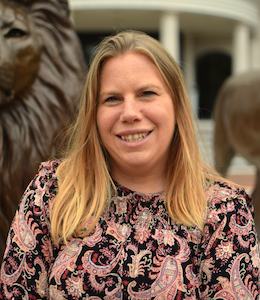
Hyatt Hall, Office #320
